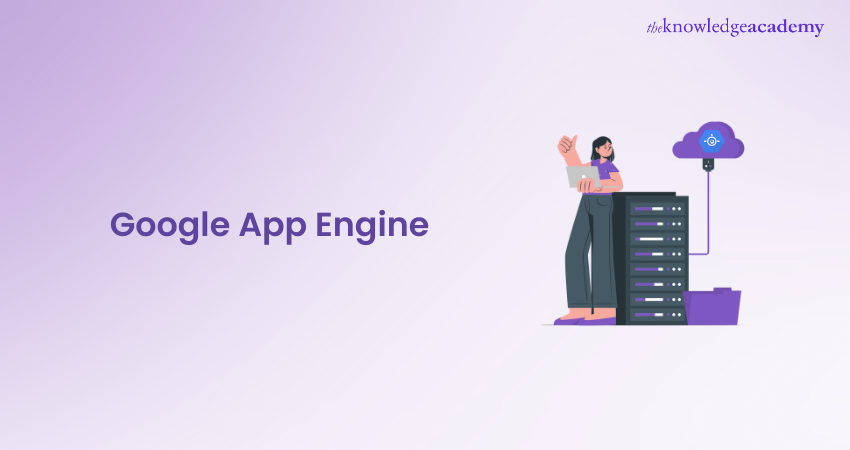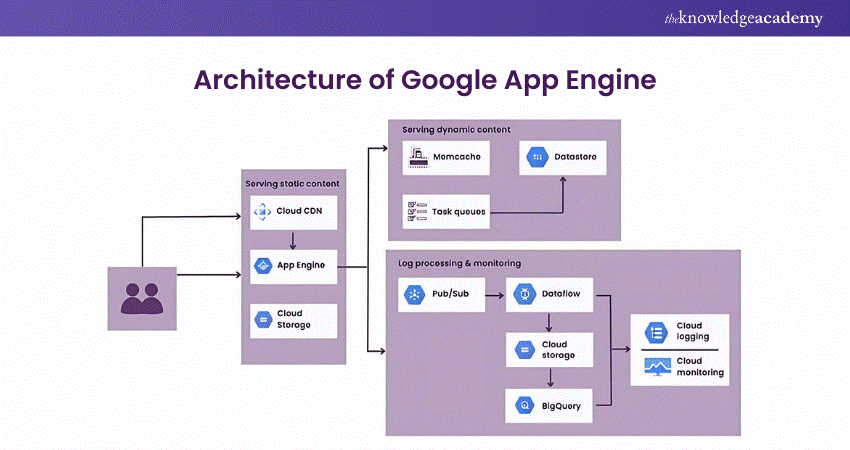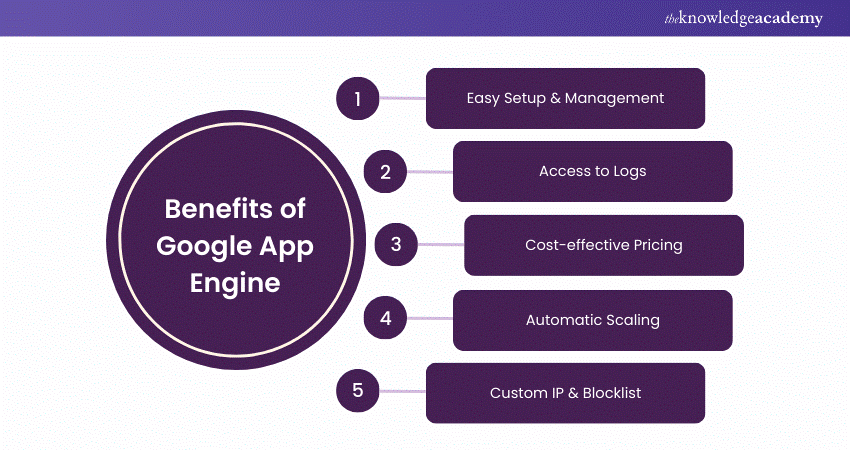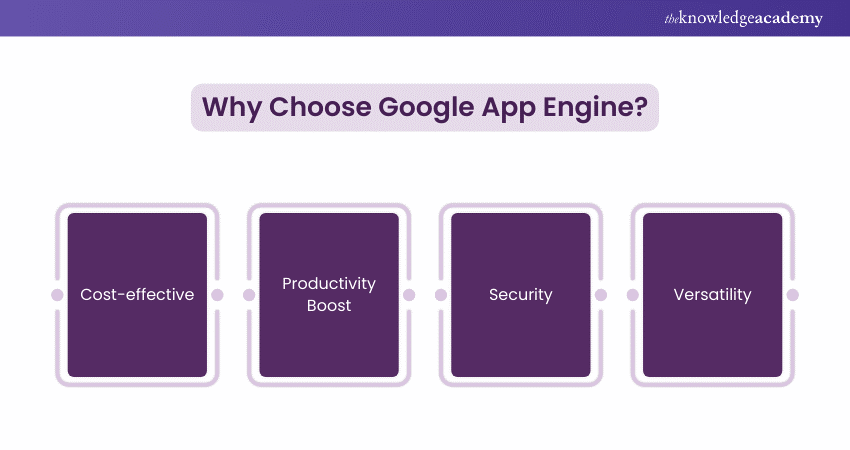We may not have the course you’re looking for. If you enquire or give us a call on +44 1344 203 999 and speak to our training experts, we may still be able to help with your training requirements.
Training Outcomes Within Your Budget!
We ensure quality, budget-alignment, and timely delivery by our expert instructors.

Imagine a platform where you can focus solely on coding, free from the complexities of infrastructure management. Google App Engine offers exactly that—a fully managed, serverless environment tailored to simplify the development and hosting of web applications. Sanctioning a variety of programming languages and frameworks, it automatically handles server provisioning, scaling, and traffic management. Whether you’re working on a small project or scaling a large enterprise solution, Google App Engine provides the tools and flexibility to grow with your needs, ensuring your success.
Table of Contents
1) What is Google App Engine?
2) How is the Google App Engine Used used?
3) The Architecture architecture of Google App Engine
4) Features of App Engine
5) Google App Engine Apps
6) What are the Benefits and Challenges of Using Google App Engine?
7) Why Choose Google App Engine in Cloud Computing?
8) Conclusion
What is Google App Engine?
Google App Engine (GAE) is a platform-as-a-service (PaaS) that allows web developers and enterprises to build, deploy, and host scalable, high-performance applications in Google’s fully managed cloud environment, eliminating the need for infrastructure provisioning or management.
As a fully managed and serverless application development platform, GAE handles the entire process of uploading and running code on Google Cloud. It automatically provisions the necessary infrastructure based on the CPU and memory requirements specified by the developer.
GAE supports multiple programming languages and custom containers, providing development kits and runtimes for development, testing, and debugging. It also grants a comprehensive suite of developer tools to streamline app development, testing, debugging, deployment, and performance monitoring.
How is the Google App Engine Used?
Google App Engine is a serverless platform, which hosts, and allows developers to build and deploy web applications. Developers or users can create an account in Google App Engine to set up a Software Development Kit (SDK), to write the source code of applications easily.
It is also used to build scalable back end mobile applications. These are then used to adapt workloads as needed. Google App Engine can also be used for application testing where users can route traffic to different application versions.
Discover the power of Google Cloud Console! Learn how to manage and monitor your cloud resources with ease. Start exploring today!
The Architecture of Google App Engine
Google App Engine’s architecture in Cloud Computing is both scalable and robust, designed to cater to a diverse range of applications and services. Here's a concise breakdown of its structure below:

1) Datastore: Serving as the central data management system in Cloud Computing, Google App Engine's Datastore is a NoSQL database renowned for its scalability. What sets it apart is its dynamic nature, adapting in real-time to the demands of the application. Whether it's a minor data retrieval or a massive data influx, the datastore scales on-the-fly, ensuring that data remains consistently accessible and safeguarded against potential threats.
2) Task Queues: In any application, there exist tasks that don’t necessitate immediate user feedback. Google App Engine's Task queues are designed to manage such background operations. By queuing these tasks, they're executed asynchronously, optimising application performance and ensuring users aren't bogged down with processing delays.
3) Memcache: As a rapid-access in-memory caching system, Memcache plays a pivotal role in enhancing data retrieval speeds. Especially beneficial for frequently queried data, it acts as a buffer, reducing the datastore's workload. This not only ensures quicker response times but also contributes to the longevity and efficiency of the main Datastore.
Discover the steps to launch your career! Learn How to become a Google Cloud Engineer with our expert guide and start mastering cloud technology today!
4) Blobstore: In today's digital age, applications often deal with voluminous data, be it high-definition images, videos, or other large files. The Blobstore is Google App Engine's dedicated solution for such requirements. By efficiently managing and storing these large objects, it ensures that the primary datastore isn’t overwhelmed, maintaining a harmonious data ecosystem.
5) Automatic Scaling: One of Google App Engine’s crowning features, Automatic Scaling, epitomises proactive resource management. By continually monitoring application traffic and user requests, it dynamically scales resources. This ensures optimal performance even during unexpected traffic surges, eliminating the need for manual adjustments and guaranteeing a consistently smooth user experience.
6) Integrated Services: Google App Engine isn't an isolated entity but a cog in the vast machinery of Google Cloud Computing services. Its ability to seamlessly mesh with other services, from Data Analytics platforms to state-of-the-art Machine Learning tools, transforms it from a mere hosting platform to a comprehensive, integrated Cloud solution. This interoperability enhances the capabilities of applications hosted on Google App Engine, giving Developers a richer toolset to work with.
Learn Google Cloud Fundamentals with our Google Cloud Platform Fundamentals Course – Sign up today!
Features of App Engine
Google Cloud provides two options for utilising App Engine: The Standard Environment and the Flexible Environment.
Standard Environment
The Standard Environment operates on Google's managed infrastructure and is compatible with languages such as Python, Go, and Node.js. It is created for tasks with high levels of demand and extensive sets of data. Some of the main characteristics are:
a) Persistent Cloud Storage that includes querying, sorting, and transaction functionalities
b) Automated adjustment of capacity and distribution of workload
c) Task queues that handle background work in an asynchronous manner
d) Planned activities for recurring or time-based occasions
e) Collaboration with additional services and interfaces in Google Cloud
Prepare like a pro with our expert tips on Google Cloud interview questions. Equip yourself with answers that will help you ace your next interview.
Flexible Environment
The Flexible Environment, built on Google Compute Engine, offers developers increased flexibility. It provides custom runtimes with Docker, extends request and response timeouts, and allows for the installation of custom software. Some important characteristics are:
a) Customised Infrastructure: Users have the option to use custom libraries, SSH for debugging, and deploy Docker containers on virtual machines in Compute Engine.
b) Open-source Community: Backs a variety of open-source tools and frameworks
c) Native Feature Support: Support for native features includes microservices, authorisation, SQL and NoSQL databases, traffic splitting, and logging.
d) Performance: Provides various CPU and memory setups for the best possible performance.
Streamline data processing with Google Cloud Dataflow! Handle real-time and batch data seamlessly. Start optimizing your data pipelines today!
Google App Engine Apps
A Google App Engine (GAE) application consists of a primary container that includes a minimum of one service, version, and application resource. Every resource contains multiple services that can utilise various runtimes and levels of performance. Various service versions can be implemented to operate in instances depending on set traffic levels.
GAE enables the hosting of various app versions on Google Cloud. Developers can divide traffic between versions for conducting A/B testing and implementing new features. GAE allows for app debugging at all points, even during production.
Supercharge your AI capabilities with Google Cloud AI tools! Dive into the best solutions to advance your projects and stay ahead of the curve.
What are the Benefits and Challenges of Using Google App Engine?
In this section, we are going to discuss about the several benefits and challenges of using Google App Engine. These are as follows:
Benefits of Using Google App Engine
Here are some benefits of using Google App Engine:

a) Easy Setup & Management: Google App Engine is easy to set up. It can also be easily managed which makes it more attractive to its users. Its users can write codes without having the need to consider help from core IT professionals. It also allows its users to build back-end infrastructure. The built-in APIs, in Google App Engine allows users to build several different types of applications.
b) Access to Logs: It also has the access to all the application logs which facilitates debugging and monitoring in production.
c) Cost-effective Pricing: The pay-per-use pricing of Google App Engine makes it cost-effective and therefore users flock towards it. It has several resources which the users can use to monitor their resources and keep track of their bills in the dashboard.
d) Automatic Scaling: It can automatically scale as the workloads fluctuate for the users. It can automatically add and remove application resources as per the demand.
e) Custom IP & Blocklist: It can specify a range of Internet Protocol addresses (IP) which are acceptable. Moreover, it also has the bandwidth to allow users to prepare a specific list of networks and resources and prepare blocklist for certain IP addresses.
Challenges of Using Google App Engine
Google App Engine has some drawbacks as well. Let’s discuss some of the challenges of using Google App Engine:
a) Dependency on Google: Because of its back-end infrastructure it is sometimes difficult for users to fix their problems on their own. They have to depend on Google to fix those problems, which can sometimes be time-consuming.
b) Performance Limits: Google App Engine has performance limits. This means that all CPU-intensive operations can be a little bit expensive and slow, when using Google App Engine. The reason for this limitation can be that one physical server may serve numerous separate and related app engine users at the same time, who need to share the CPU.
c) Limited Filesystem Access: GAE only provides limited read-only access to Google App Engine filesystem to Developers.
d) Java app Limitations: It limits Java apps. In Google App Engine Java apps are not able to create new threads and only certain sections of Java runtime environment can be implemented.
Gain Google network insights with our Networking with Google Cloud Platform Course now!
Why Choose Google App Engine?
Google App Engine in Cloud Computing possesses a list of benefits over other services, which make it a standard choice for enterprises. Some of these benefits are as follows:

1) Cost-effective
One of the most compelling reasons to opt for Google App Engine is its cost-efficiency. Unlike traditional hosting, where overheads can rack up quickly, this tool's fully managed nature means there's no need to invest in system administration. In this Cloud Computing model, you pay strictly for the resources you consume. This allows businesses, from startups to large enterprises, to scale their operations without the dread of unexpected costs. The adaptability of adjusting your usage according to the demand ensures that you're always in control of your expenses.
2) Productivity Boost
Time is of the essence in the Cloud Computing domain. It is attuned to this reality. By taking on the responsibility of infrastructure-related tasks, it liberates Developers to zero in on what truly matters: crafting exceptional code and refining their application. Without the distractions of backend management, Developers experience a tangible uptick in their productivity, ensuring that projects are delivered faster, and innovations reach the market promptly.
3) Security
Nowadays cyber threats are rife, thus security isn't just a feature,it's a necessity. The Google App Engine stands tall on the foundation of Google's globally recognised secure infrastructure. But it doesn't just rest there; it continually fortifies its defences. Google App Engine uses its built-in security protocols and a commitment to meet the strictest compliance standards to ensure that your applications are ensconced in a digital fortress, safeguarded against potential threats.
4) Versatility
Google App Engine’s versatility shines through in its ability to support several projects. Whether you're aiming to launch a minimalist web application or architecting a labyrinthine system teeming with features, it is up to the task. From serving static web pages to managing backend operations for mobile applications bustling with high traffic, it proves time and again that it's a multifaceted Cloud Computing solution equipped to handle the diverse needs of the digital age.
Unlock the power of Google Cloud Storage! Safely store, manage, and access your data from anywhere. Simplify your cloud experience today!
Conclusion
The prominence of Google App Engine in Cloud Computing cannot be understated. It serves as a beacon of advanced design and user-friendliness, catering to both Developers and enterprises seamlessly. It stands out as the go-to choice for those seeking a dependable and secure Cloud infrastructure. When one aligns with Google App Engine, they're not only embracing the pinnacle of Cloud technology but also ensuring their applications consistently deliver top-tier performance.
Design robust Cloud Architectures with our Architecting Infrastructure with Google Cloud Platform Training – Register today!
Frequently Asked Questions

To start using Google App Engine, sign in to the Google Cloud Console, create a new project, and navigate to “App Engine” > “Dashboard.” Create an application, choose a region, set up your runtime environment, and deploy your app using the Google Cloud SDK.

Google Search Engine is generally safe due to Google Safe Browsing, HTTPS encryption, and privacy settings. These measures protect users from harmful websites and secure data transmission. However, always practice safe browsing by avoiding suspicious links and being cautious with personal information.

The Knowledge Academy takes global learning to new heights, offering over 30,000 online courses across 490+ locations in 220 countries. This expansive reach ensures accessibility and convenience for learners worldwide.
Alongside our diverse Online Course Catalogue, encompassing 17 major categories, we go the extra mile by providing a plethora of free educational Online Resources like News updates, blogs, videos, webinars, and interview questions. Tailoring learning experiences further, professionals can maximise value with customisable Course Bundles of TKA.

The Knowledge Academy’s Knowledge Pass, a prepaid voucher, adds another layer of flexibility, allowing course bookings over a 12-month period. Join us on a journey where education knows no bounds.

The Knowledge Academy offers various Google Cloud Certifications, including Google Cloud Training, Google Cloud Platform Fundamentals, and Google Cloud Storage Training. These courses cater to different skill levels, providing comprehensive insights into What is Google Cloud Platform.
Our Cloud Computing Blogs cover a range of topics related to Google Cloud Training, AWS Certification, offering valuable resources, best practices, and industry insights. Whether you are a beginner or looking to advance your Cloud Computing skills, The Knowledge Academy's diverse courses and informative blogs have got you covered.
Upcoming Cloud Computing Resources Batches & Dates
Date
 Google Cloud Platform Fundamentals
Google Cloud Platform Fundamentals
Fri 10th Jan 2025
Fri 14th Mar 2025
Fri 9th May 2025
Fri 11th Jul 2025
Fri 12th Sep 2025
Fri 14th Nov 2025







 Top Rated Course
Top Rated Course



 If you wish to make any changes to your course, please
If you wish to make any changes to your course, please


